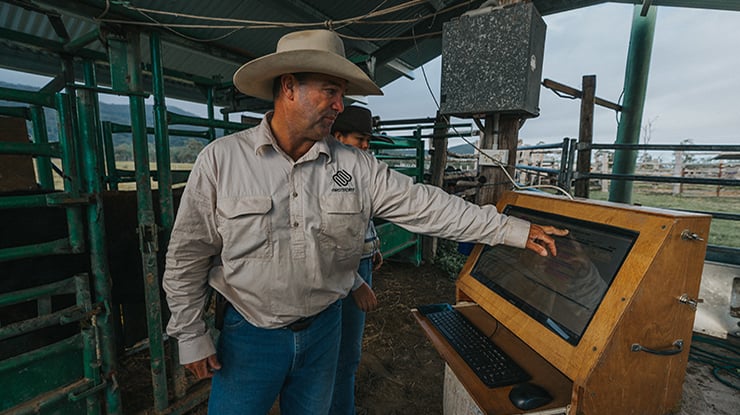
Data collection of the highest degree
Sustainability traits are front-and-centre for Queensland Wagyu seedstock producers the Hamblin family, alongside fertility and eating quality.
Darren (pictured above) and Melanie Hamblin and their family run around 6,000 Wagyu across three properties in Central Queensland and on the Darling Downs.
Their breeding objectives are well-rounded: to breed an animal with good fertility and reproductive capacity, good meat-eating quality for consumers, and sustainability traits such as the polled gene and with good feed efficiency.
Through good data and genetics, they’re achieving constant improvements in business and herd performance.
“Firstly, you need to understand: What are the profit drivers in my business? Once you understand that, you need to collect the data which links to those traits,” Darren said.
Sustainability
The Hamblins’ approach to sustainability is one of constant improvement – for them, it means looking ahead to the future needs of producers, consumers and the wellbeing of their livestock.
This is evidenced by how their approach to genetic selection has evolved.
The Hamblins’ shift into the Wagyu breed was driven initially by fertility benefits, but the eating quality of Wagyu beef has emerged as highly valuable. The value of a Wagyu carcase is driven by weight and marble score, both of which can be maximised through selective breeding.
“We can have a swing in carcase value from $3,000 up to $6,000 for the same animal that’s cost you the same to breed and feed, so you can appreciate why we want to aim for those better traits,” Darren said.
Their breeding focus has expanded to traits that produce cattle which are resilient in harsh climates, as well as carrying strong sustainability credentials.
These traits include the polled gene, fineness and distribution of marbling and Net Feed Intake.
Darren believes the future market will financially reward these traits and, as a breeder supplying commercial producers, he wants his industry to be ready to capitalise when this market opportunity arrives.
“Even though we’re not paid for those traits now, I know we will be and I don’t want to be 15 years behind, catching up on that trait,” he said.
Darren and Melanie are the northern lead in the Australian Poll Wagyu program, which works to selectively breed polled genes into Wagyu cattle without compromising carcase performance or fertility.
This removes the dehorning process, resulting in improved animal welfare, workplace safety, reduced labour costs and minimised production setbacks.
Technology
Darren has been a long-term user of technology to analyse pedigree data.
He’s moved into genomic testing and Singular Nucleotide Polymorphism (SNPs). SNPs provide him with DNA markers that, when linked with sufficient historical performance data, increase the accuracy of his selection decisions.
The production and carcase data he’s collected over many years has been invaluable in tracking historical trends and progress, and when combined with SNPs, become extremely powerful predictors of future selection outcomes.
Darren’s attention to capturing data to support his selection decisions also includes:
- collecting data using individual crush-side software, eID tags and weigh scales
- collecting data about calves, their mothers, date of birth and gender
- keeping information on batch numbers, chemical injections and vaccination information for traceability
- conducting ultrasounds and pregnancy testing 35 days after artificial insemination to find the most fertile cows
- averaging carcase size and marble scoring of all offspring from a certain sire and dam to find positive and negative traits
- analysis of genomic testing and SNPs linked back to historical performance data.
The information aids accurate selection for sustainable traits, product quality and economically-viable production – tying into the Hamblin’s strong commitment to data, carcase feedback and whole of life traceability.
“It’s not just about collecting data, but fully interpreting it and utilising it,” Darren said.
“People think data collection is just a few key things, but for us, everything we do is data collection. The beauty of having all this information is it allows me to go back and rethink what traits we need moving forward.”



